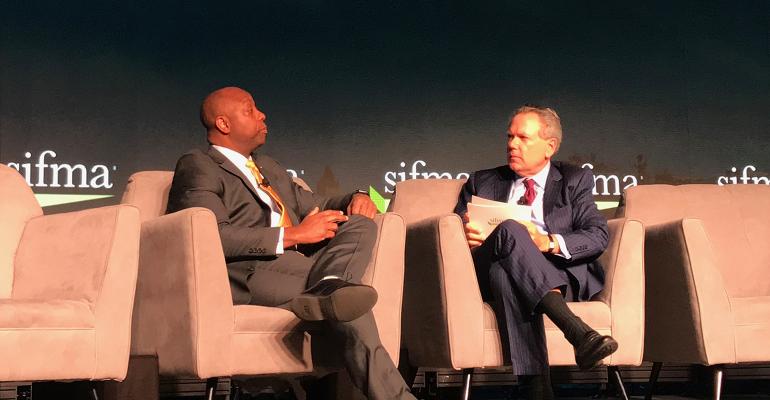Sen. Tim Scott (R-S.C.) believes that Congress could pass reporting requirements for opportunity zones, lauding the program in the aftermath of a spate of negative coverage over the programs. During a Q&A at the annual meeting of the Securities Industry and Financial Markets Association (SIFMA) in Washington, D.C., Scott said most news about the zones has been positive, despite rising questions on whether the zones are actually fulfilling their stated goal of encouraging investment in low-income communities.
“When you think about these areas, you have a lot of talent, a lot of potential, but not a lot of access to those opportunities,” Scott said.
Scott was a strong advocate for opportunity zones, which allows investors to defer (and potentially eliminate) their capital gain tax liability by investing in one or a number of 8,700 low-income census tracts in the country. The plan has since come under scrutiny, with reports from the New York Times and ProPublica suggesting that wealthier investors may be overly investing in designated zones that include affluent areas and are less in need of tax breaks for investment.
Earlier this year, Scott co-sponsored legislation with Sen. Cory Booker (D-N.J.) to introduce reporting requirements for opportunity zones, mandating an annual review of the zones and their impact on the communities. Scott explained that Congress used reconciliation to pass the 2017 tax cuts legislation, which included the opportunity zones' reporting requirement, but it was dropped before the final legislation was passed. Scott said he was hopeful the Office of Information and Regulatory Affairs (OIRA), a division of the White House Office of Management and Budget, would clarify some of the ambiguities around the rules by the end of the year, which would encourage further investment.
“I think most businesses would agree that certainty and predictability leads to a lot more success and a lot more investment. So once the (regulations) are finalized and opened to public review, I think we’ll see more investments, not less,” he said. “I do think there’s an appetite for us to have more clarity on where people are investing.”
SIFMA President and CEO Kenneth Bentsen and Scott also discussed whether the Senate might consider the SECURE Act this year. The proposed legislation purports to make it easier for businesses to introduce retirement plans, allow part-time employees to sign up for plans and change the age at which investors would need to take required minimum distributions from 70 ½ to 72 years old; it was overwhelmingly passed by the House of Representatives in a 417-3 vote but remains stalled in the Senate.
Scott estimated the law was supported by approximately 70 to 80 Senators, and hoped that the small number of Senators holding up its progress would reconsider if given floor time for amendments they wanted. When Bentsen asked if there could be a “Christmas surprise” for the act, Scott said it was possible the law could still be attached to must-pass Senate legislation, like a continuing resolution to fund the government or the National Defense Authorization Act, which is passed annually.
“It would be nice to have a Christmas surprise that’s not a bag of coal for members of Congress and the Senate, though we might deserve it at some point. But I do think there is still a possibility of the SECURE Act being attached to some legislative vehicle,” he said. “Getting something this bipartisan, this positive, and frankly, this impactful on the average person in the country and not get it done in 2019? It’s a shame.”
Joseph E. Sweeney, the president of advice and wealth management, products and service delivery at Ameriprise (and SIFMA’s 2019-2020 chair) reiterated the need for movement on the SECURE Act in a panel discussion Tuesday morning.
“It’s one thing to have a product solution, but like everything in this world, it’s more complicated than that,” he said. “We also need to have legislative solutions, particularly when people are working longer and living longer.”





